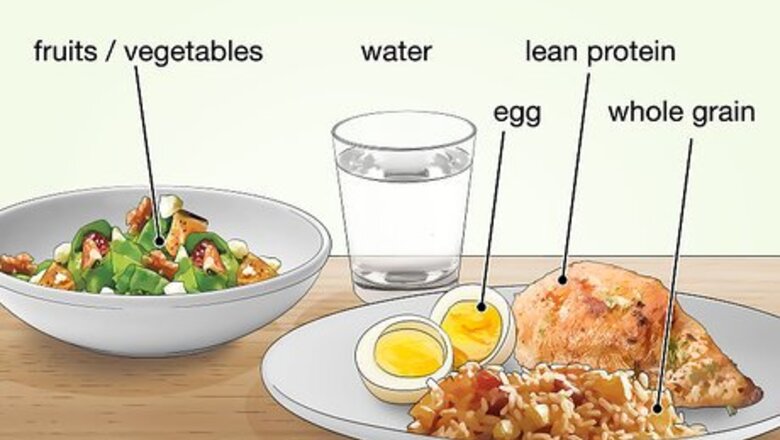
views
Making Lifestyle Changes
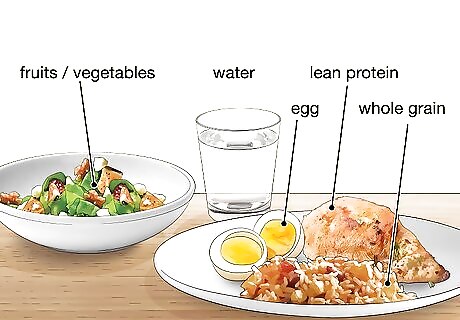
Eat a healthy diet to get the vitamins and nutrients your beard needs. Like any other part of your body, your beard needs vitamins and nutrients to grow properly. Be sure your diet includes a balanced mix of whole grains, lean protein, healthy fats, fruits, and vegetables. Remember to also drink plenty of water and other fluids to stay hydrated. Since your hair is protein-based, it’s especially important that you eat plenty of protein. Sources of protein include: lean meats, eggs, dairy products, beans, legumes, seeds, and nuts. Adult men should aim to consume around 0.84 grams (0.030 oz) of protein per 1 kilogram (2.2 lb) of body weight.
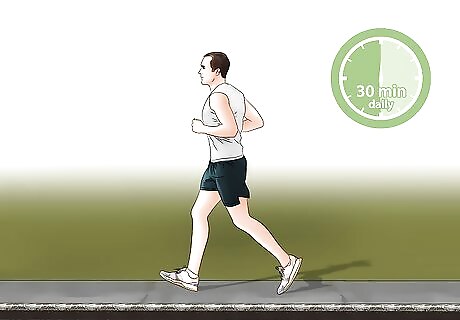
Exercise to help stimulate hair growth. Being physically active on a regular basis will help boost your blood circulation. Better blood circulation will allow more nutrients to reach your hair roots, helping to boost hair growth. Try to get at least 30 minutes of aerobic exercise every day by jogging, taking a brisk walk, or riding a bike. If you don’t exercise much, ease into an exercise regime gradually so that you don’t injure yourself.
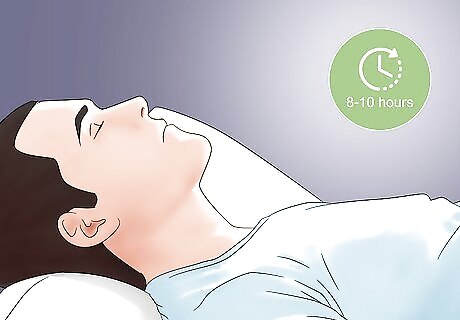
Reduce stress in your life to keep your hair healthy. Constant, high levels of stress can make your hair more brittle and even cause it to fall out. You can minimize stress in your life by getting enough sleep every night, exercising regularly, and participating in relaxing activities. Aim to get between 8-10 hours of sleep a night if you’re a teenager, and at least 7 hours of sleep if you’re over 18 years of age. Activities like yoga, meditation, and reading can also help you relax.
Taking Care of Your Facial Hair
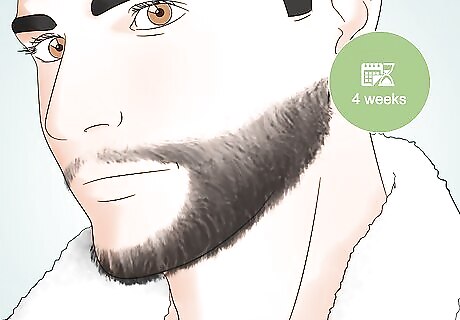
Let your beard grow for at least 4 weeks. You’ll need to let your facial hair grow out a while before you can determine just how thick it looks. While your beard may look patchy and uneven after a week of letting it grow out, after 4 weeks, it may actually look lush and full. Try not to start trimming your beard too soon. Don’t trim any hair until you reach the 3rd week or so. Itchiness usually fades after the 2nd week of growing out your facial hair.
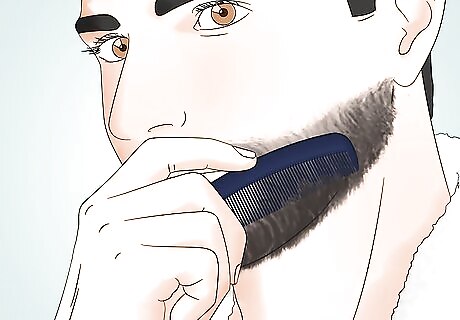
Comb and brush your facial hair to cover patchy spots. As you let your facial hair grow out, comb and brush it daily. Comb areas that are thicker towards the patchier areas you want to cover. This will help train the hairs to grow in that direction. If you plan to keep a beard long term, consider investing in a quality beard brush.
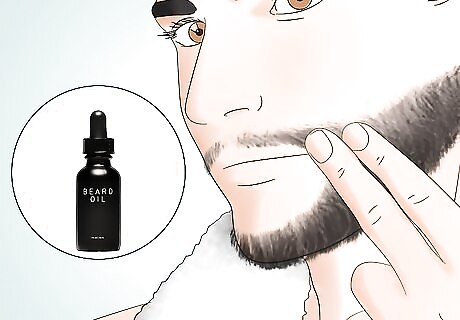
Apply a beard oil to your beard to soften and nourish it. In addition to eating a healthy and well-balanced diet, using beard oil is another great way to supply your beard with the vitamins and nutrients it needs to look full and healthy. Apply beard oil to your facial hair once a day to begin with. Apply your beard oil soon after you get out of the shower, when your beard is still slightly damp, but not dripping wet. Beard oil will also help reduce the itchiness of your facial hair during the first 2 weeks of growth.
Using Hair-Growth Products
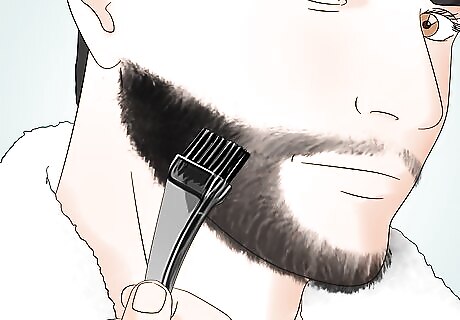
Dye your facial hair to make it look thicker. If some of your facial hairs are blond, light brown, or gray, your facial hair may look thinner and patchier than it really is. Dyeing your facial hair a darker color will make these hairs more visible, making your beard or mustache look fuller and more uniform. You can find hair dye made for coloring facial hair at your local drug store. When dyeing your facial hair, follow the directions on the container closely, so you don’t end up with dye spots on your skin.
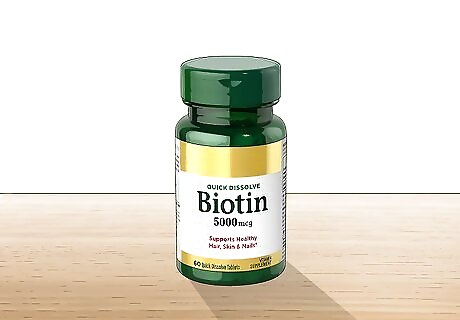
Take biotin supplements daily to thicken your facial hair. Biotin supplements may help thicken your facial hair by strengthening your hair’s keratin infrastructure, giving your facial hair a fuller appearance. You can find biotin supplements over-the-counter at your local drug store. Biotin supplements, unfortunately, won’t make hair grow in places where there isn’t any to begin with. Products marketed as beard-growing pills are usually a combination of biotin, vitamin C, zinc, and other vitamins. The claims of these and other supplements haven’t been proven in clinical trials, so take them with a hefty grain of salt.
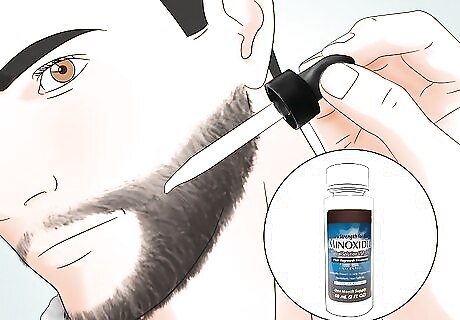
Apply Minoxidil (aka Rogaine) to your facial hair. Minoxidil helps stimulates blood circulation, which allows more nutrients and hormones to reach your hair follicles. This helps encourage growth of your hair. You can buy Minoxidil as a foam or liquid. You can purchase Minoxidil at your local drug store. The 2 most common side-effects users of Minoxidil experience are lower blood pressure and dry, irritated skin.
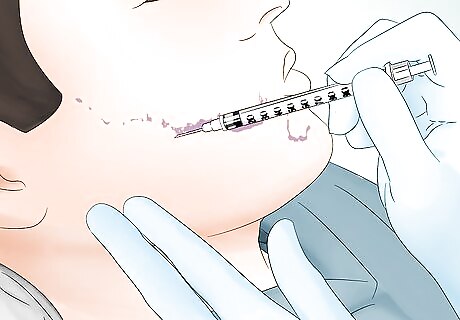
Look into getting a beard transplant if other methods don’t work. A beard transplant involves a doctor taking hairs from the back of your scalp and transferring them to areas on your face where you want thicker hair. After the procedure, it may take a few months for you to see its final results. The procedure typically takes several hours and requires the application of a local anesthetic. A beard transplant can cost upwards of $7,000.




















Comments
0 comment